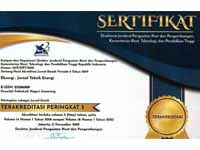PENGOLAHAN AIR LIMPASAN BATUBARA PADA PLTU TANJUNG JATI B UNIT 3 DAN 4
DOI:
https://doi.org/10.32497/eksergi.v9i3.184Abstract
Tujuan dilakukan pengolahan air limpasan batubara adalah untuk mendapatkan parameter baku mutu air limbah yang telah ditetapkan oleh kementrian lingkungan hidup agar air limbah tersebut aman terhadap lingkungan. Pengolahan air limpasan tersebut dengan dilakukan pemasangan sistem pipa apung pada coal run off pond, pipa apung tersebut terhubung oleh pompa yang berada pada pump pit. Masukkan pipa apung tersebut dapat diatur ketinggiannya sesuai dengan level air limpasan batubara pada coal run off pond. Sehingga air yang akan dihisap pada pump pit adalah air permukaan coal run off pond dengan kandungan Total Suspended Solid (TSS) kecil. Sebelum dilakukan pemasangan pipa apung kandungan Total Suspended Solid (TSS) pada waste water treatment plant (WWTP) Retention basin adalah 6000 mg/liter. Setelah dipasang sistem pipa apung ini didapatkan hasil pada waste water treatment plant (WWTP) Retention basin adalah 475 mg/liter. Berdasarkan hasil ini dapat disimpulkan bahwa dengan pemasangan pipa apung pada coal run off pond dapat mengurangi kandungan Total Suspended Solid (TSS) pada waste water treatment plant (WWTP) Retention basin .
Kata kunci : air limpasan batubara, coal run off pond, total suspended solid (TSS)
Downloads
Published
Issue
Section
License
Authors who publish with this journal agree to the following terms:Authors retain copyright and grant the journal right of first publication with the work simultaneously licensed under a Creative Commons Attribution License that allows others to share the work with an acknowledgement of the work's authorship and initial publication in this journal.
Authors are able to enter into separate, additional contractual arrangements for the non-exclusive distribution of the journal's published version of the work (e.g., post it to an institutional repository or publish it in a book), with an acknowledgement of its initial publication in this journal.
Authors are permitted and encouraged to post their work online (e.g., in institutional repositories or on their website) prior to and during the submission process, as it can lead to productive exchanges, as well as earlier and greater citation of published work (See The Effect of Open Access).







